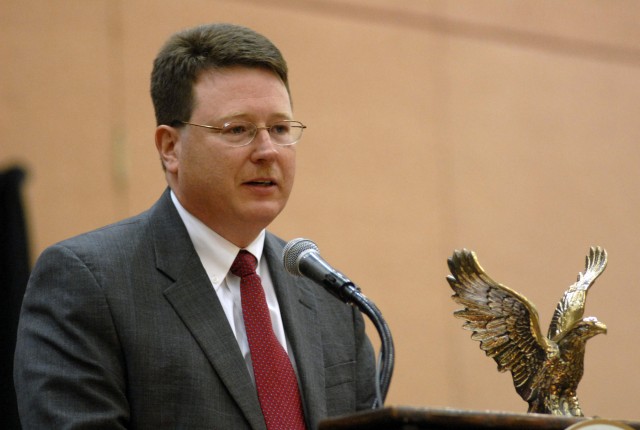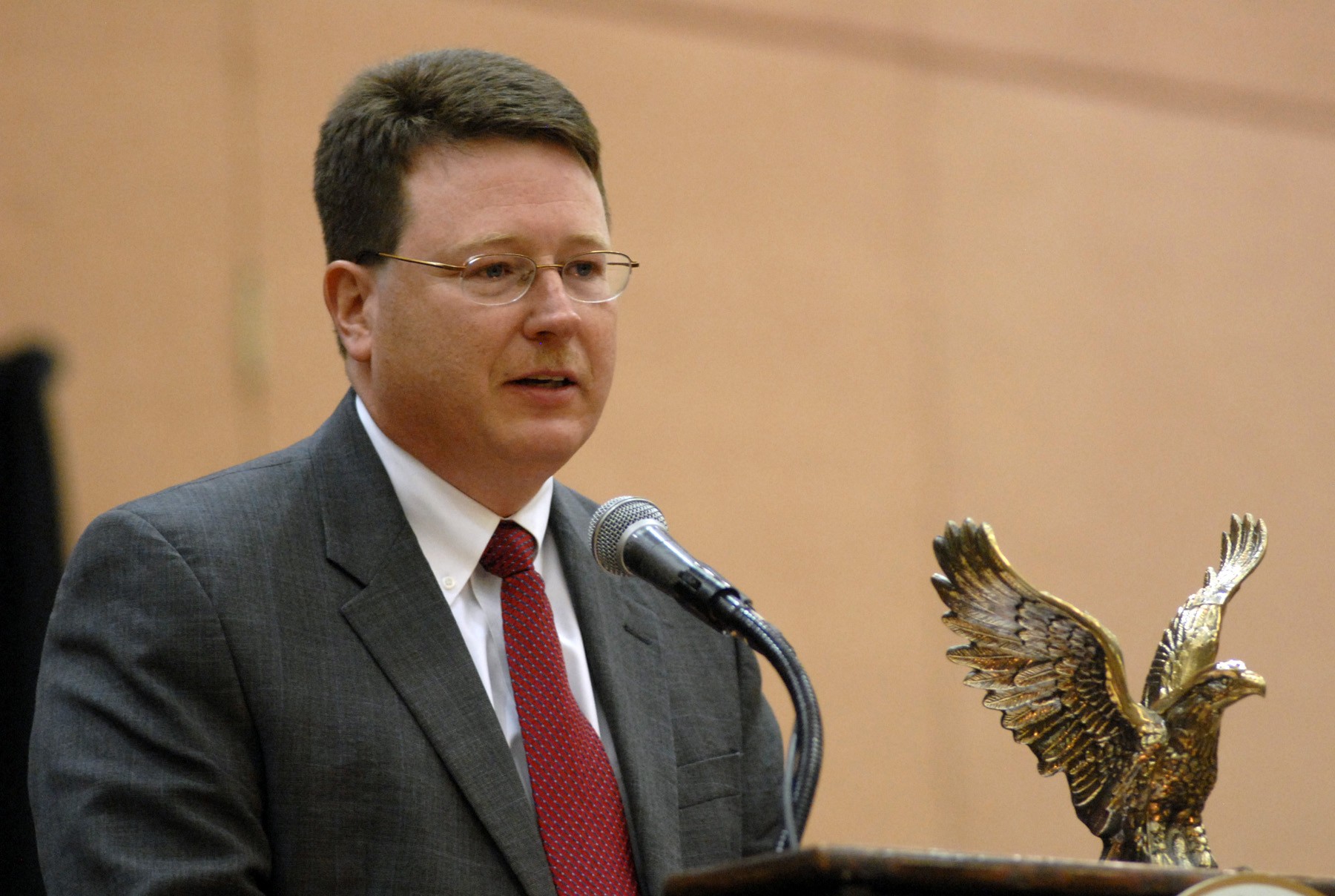
REDSTONE ARSENAL, Ala.--On a night when everyone was congratulating Lars Ericsson on his win as the top Department of the Army civilian at Redstone Arsenal, this chief scientist could only think about the Soldiers who have put his organization's unmanned aircraft systems to good use in theater.
Accepting his award, first, as the top nominee in the Management/Executive category and then, second, as 2011 DA Civilian of the Year from members of the Redstone-Huntsville Chapter of the Association of the U.S. Army, Ericsson couldn't help but focus his attention on the battle ribbons cascading from the Army flag behind the podium on the awards stage.
"Battle ribbons are still being put on that flag in the United States Army," Ericsson said at the April 5 awards dinner at the Von Braun Center's North Hall.
"We have the privilege to work for a great organization that gives us the opportunity to take on this great mission, and to try to do great things for those young men and women who choose to wear the uniform."
Ericsson, who will now represent the local chapter in the competition for AUSA's Third Region Civilian of the Year award and possibly in the competition for the national award, is a 17-year veteran of the Unmanned Aircraft Systems Project Office, Program Executive Office for Aviation. He is the chief technologist and lead architect for the Army's unmanned aircraft systems, including Shadow, Raven, Hunter and Gray Eagle.
In accepting the bronze Eagle trophy of the DA Civilian of the Year, Ericsson thanked "my Lord and Savior who has strengthened me for this work and my wife Sandy for understanding when I've been away."
Speaking to an audience of about 350 attendees, Ericsson expressed his pride in being part of an aviation systems program in support of an Army that provides the "best equipment, best training and best support" for the Soldiers who take on difficult and dangerous missions at threat of life and limb, and perform an honorable duty because their nation has asked them to.
"Any day that we have the opportunity to provide them with new gear, or improved gear so they can do what they do and they can come home to their families, we're doing great work," Ericsson said.
Referring to the early days of unmanned aircraft systems, Ericsson said it was the Soldiers who proved the technology could make a difference in theater.
"They decided to trust us ... and take this technology into combat. We can only give it (the new technology) to them and they have to take it forward," he said.
Ericsson was nominated by Col. Greg Gonzalez, the Unmanned Aircraft Systems project manager, with a letter of nomination from Maj. Gen. Tim Crosby, program executive officer for aviation.
In his nomination letter, Ericsson, who leads a team of about 30 scientists and engineers with responsibility for more than $100 million in contracts, was described as having an "innate ability to create an environment for success, and guides his programs with a steady hand. He allows his team to work without interruption, yet somehow stays two steps ahead of all the issues as they emerge. His ability to manage a multitude of concurrent, high-risk programs has led to numerous high-reward programs within the Army, and has reflected well on his management, project management of Unmanned Aircraft Systems and the Army as a whole."
That innate ability for success could be attributed to all 16 candidates for the DA Civilian of the Year award.
"I think we've chosen another wonderful set of winners this year," Steve Taylor, president of the Redstone/Huntsville Chapter of AUSA, said.
The nomination process began in January, when requests for nominees went out to the general officers and senior executive service in the Redstone/Huntsville area.
"We had an increasing number of nominees this year," event organizer Jerry Hamilton said. "We appreciate that you come out for this event. We are always supporting our Soldiers because they are the crux of what it is all about. But civilians in the Army are the constant. So we like to take the time to honor our civilians. In Huntsville, there is a great number of wonderful civilians ... The nominees are the most outstanding civilians in their organizations. It's important to stress that every single one of these nominees are winners."
After introducing the 16 nominees, the winners in three categories were announced. Besides Ericsson in the Management/Executive category, Unmanned Aircraft Systems also picked up a win in the Professional/Technical category -- Dana Osborne, chief of the Unmanned Aircraft Systems Resource Center; and program integrator and acting chief of the Unmanned Aircraft Systems Operations Branch. Osborne was nominated by Rusty Weiger, deputy program executive officer for aviation.
Osborne, who has a 19-year career as a DA civilian, has earned the recognition of her leaders, peers and subordinates for her endless drive, according to her nomination. "She has demonstrated true leadership, unparalleled expertise and unwavering determination in support of Army Soldiers and their use of Unmanned Aircraft Systems," the nomination said.
In the third category - the Staff/Support Category -- Elizabeth Blackmon, a protocol specialist in the Protocol Office of the Aviation and Missile Command, was the honoree. She was nominated by Barbie Baugh, chief of AMCOM Protocol with a nomination letter from AMCOM commander Maj. Gen. Jim Rogers.
"Ms. Blackmon's dedication to duty and eagerness to go the extra mile are greatly responsible for the success and stability of operations during the planning and execution of very important events. Her dedication and performance of duty is of high value to the Army," according to her nomination.
During the dinner event, last year's DA Civilian of the Year recipient, Lisha Adams, who has since been named the director of the Aviation and Missile Command's Integrated Materiel Management Center, reviewed the history of civilian service in the Army.
That service goes back to the Revolutionary War. In 1872, the Federal Civil Service was formed. But, in the early 19th century, government jobs were held at the pleasure of the president, with jobs used to support the political parties. Several laws, beginning with the Pendleton Civil Service Reform Act of 1883 and including the Hatch Act of 1939, changed the civil service so that the federal work force was appointed based on merit and prohibited from engaging in political activities while performing their duties.
In 2006 the Army Civilian Corps was formed to "unify the Army civilian service and embody the commitment of civilians who serve as an integral part of our Army team." Today, there are more than 300,000 Army civilians.
Adams recited the Army Civilian Corps Creed: "I am an Army civilian - a member of the Army team. I am dedicated to our Army, our Soldiers and civilians. I will always support the mission. I provide stability and continuity during war and peace. I support and defend the Constitution of the United States and consider it an honor to serve our nation and our Army. I live the Army values of loyalty, duty, respect, selfless service, honor, integrity, and personal courage. I am an Army civilian."
"Government employees understand success in life is not what you do for yourself, it is what you do for others," Adams said.
She also mentioned Ephesians 6, saying the Bible chapter is what she bases her life on and that its verse 7 charges all to "render service with a good attitude."
Adams also chose key words and phrases from the nominee's packets - "their ability to do their earnest effort and best thought while serving others with a good attitude," "never say no to a challenge," "always looking for new opportunities," "never fails to live up to Army values," and "work of the highest standards in service to this country," among others - to emphasize the contributions the nominees have made to their organizations and their communities.

Social Sharing